LLMs' Influence in Contemporary Business. Large Language Models (LLMs) are now crucial tools for companies looking to increase efficiency, automate procedures, and obtain strategic insights in 2025. LLMs are now enterprise-ready solutions that can revolutionize marketing, customer service, research, operations, and much more. They are no longer merely experimental A.
LLMs are being used by companies of all sizes, from large corporations to agile startups, to produce content, analyze data, and make well-informed decisions more quickly than ever before. The top ten LLM tools are examined in this guide, along with information on their features, costs, applications, and ideal business niches.
Table of Contents
What Are Large Language Models (LLMs Tools)?
AI systems that have been trained on enormous datasets to comprehend, interpret, and produce text that is human-like are known as large language models. In contrast to straightforward chatbots or rule-based systems, LLMs use deep learning to contextualize information processing, which allows for:
- Natural language comprehension: decipher difficult instructions or questions.
- Text generation: create text that is logical, pertinent, and readable by humans.
- Analyze text, audio, and images simultaneously using multimodal processing.
- Making decisions and using reasoning to produce actionable insights from input data.
Why Best LLMs Tools Matter for Businesses
- Content Generation: Automate marketing copy, blogs, newsletters, and social media posts.
- Customer service: Deliver AI-powered help with almost human precision.
- Analyze data: To find trends, summarize findings, and forecast results.
- Multilingual Communication: Easily interact with a worldwide audience.
- Operational Efficiency: Free up teams for high-value tasks by cutting down on repetitive work.
LLMs are now a strategic asset for contemporary businesses and are no longer optional.
10 Best LLM Tools for Businesses in 2025
Here’s a deep dive into the most effective LLM tools, complete with features, use cases, and business suitability.
1. GPT-4o by OpenAI
Overview: GPT-4o is OpenAI’s most advanced multimodal LLM, capable of understanding and generating text, images, and audio. It’s designed for enterprises that need a versatile AI tool that can handle multiple tasks simultaneously.
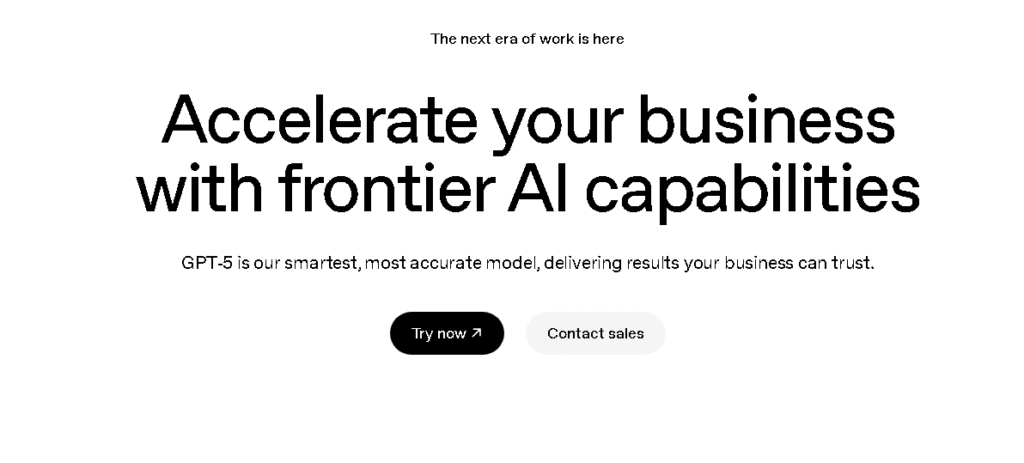
Features:
- Multimodal capabilities for text, images, and audio.
- Advanced reasoning and contextual understanding.
- API integration for business apps, CRMs, and analytics platforms.
- Human-like fluency in multiple languages.
Use Cases:
- Automated customer support across channels.
- Marketing content generation, including blogs, emails, and social posts.
- Knowledge management and internal documentation summarization.
- Meeting transcription and audio summarization.
Pricing: Subscription-based with enterprise licensing options. Costs scale with usage and multimodal features.
Best For: Large enterprises that need a comprehensive AI solution capable of handling diverse data inputs.
Example: A global SaaS company uses GPT-4o to summarize thousands of support tickets daily, reducing response times by 60% and freeing agents for complex queries.
2. Claude Opus 4 by Anthropic
Overview: Claude Opus 4 emphasizes ethical AI, safety, and interpretability, making it ideal for regulated industries such as finance, healthcare, and legal services.
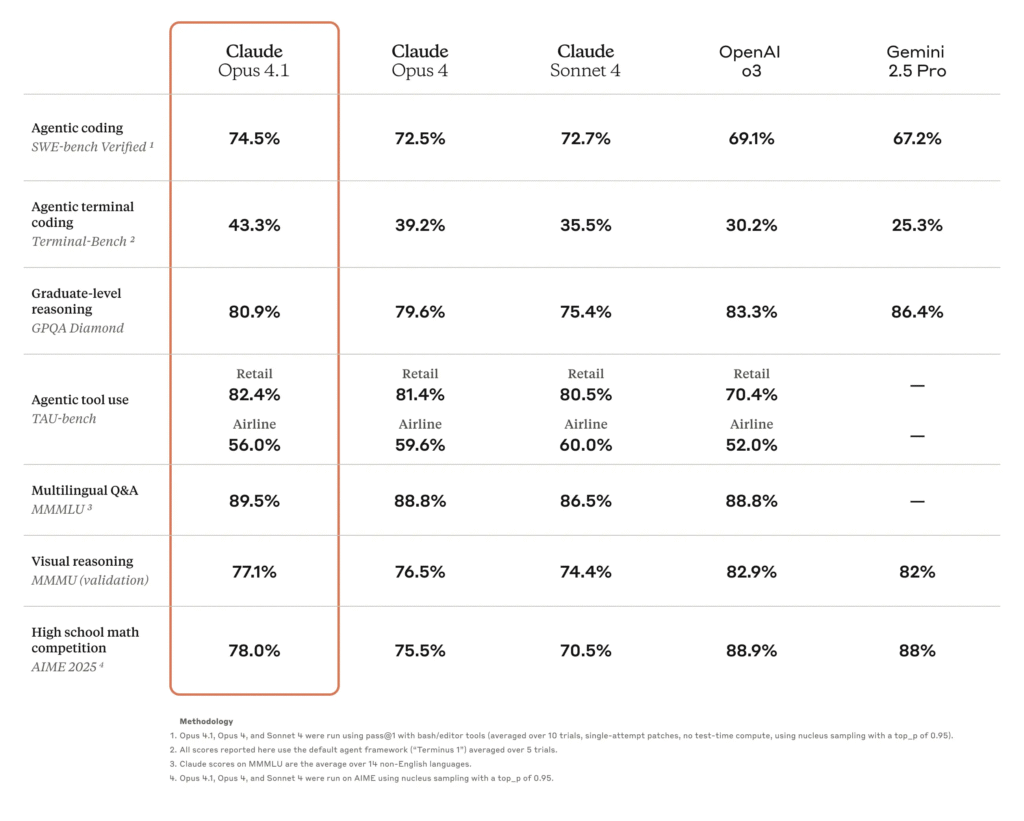
Features:
- Safe and ethical AI design minimizing harmful outputs.
- High contextual accuracy for sensitive tasks.
- Customizable to domain-specific language.
- Auditable decision-making processes.
Use Cases:
- Financial reporting and risk analysis automation.
- Healthcare documentation summarization and clinical decision support.
- Legal contract drafting and compliance monitoring.
Pricing: Custom enterprise pricing based on volume and customization needs.
Best For: Businesses in regulated industries requiring safe, reliable, and auditable AI.
Example: A healthcare provider uses Claude Opus 4 to summarize patient records and draft medical reports, saving clinicians 10+ hours per week while maintaining compliance with HIPAA.
3. Gemini 2.5 by Google DeepMind
Overview: Gemini 2.5 excels in analytics and cloud integration, particularly for enterprises using Google Workspace and Cloud services. Its multimodal abilities allow businesses to process text, images, and charts together.
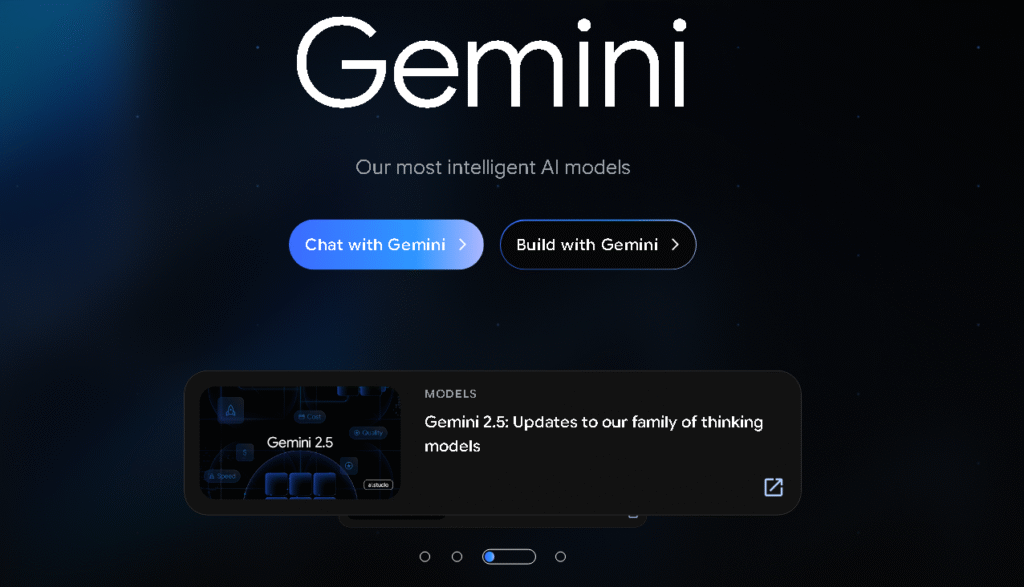
Features:
- Seamless Google Workspace integration.
- Advanced analytics and reasoning for complex datasets.
- Multimodal processing for reports and visual data.
- Scalable enterprise deployment with low latency.
Use Cases:
- Automating report generation from multiple Google Docs and Sheets.
- Summarizing business analytics and KPIs.
- Marketing campaign performance analysis.
Pricing: Pay-as-you-go via Google Cloud, flexible for startups and enterprises.
Best For: Organizations heavily using Google’s ecosystem.
Example: A multinational uses Gemini 2.5 to generate automated monthly performance reports, integrating data from multiple departments in minutes.
4. LLaMA 4 by Meta
Overview: LLaMA 4 is open-source and highly customizable, making it perfect for businesses that want full control over their AI deployments.
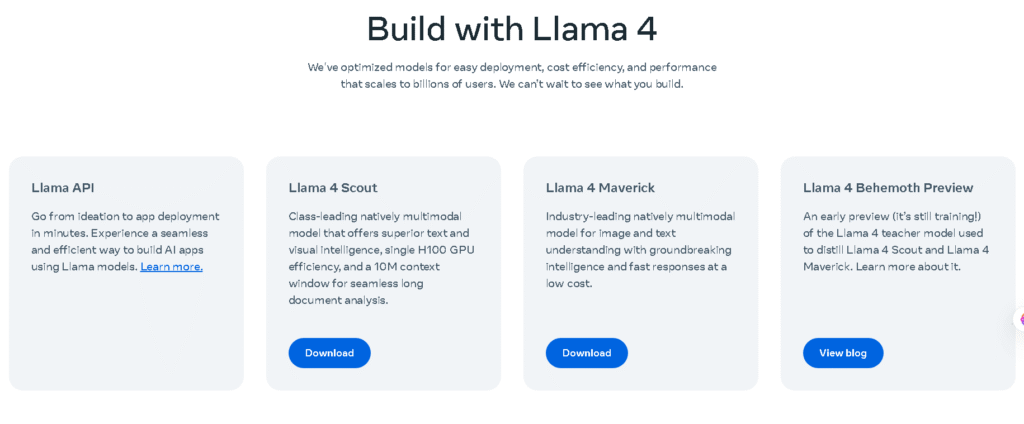
Features:
- Open-source access and large-scale deployment support.
- Customizable for domain-specific needs.
- Multimodal processing.
- Active community support for model updates.
Use Cases:
- Internal knowledge base automation.
- Research and development assistance.
- Custom AI-driven business tools.
Pricing: Free for open-source; enterprise support available.
Best For: Developers and enterprises seeking customizable AI solutions.
Example: A tech startup integrates LLaMA 4 into its product recommendation engine, tailoring responses based on user behavior and internal analytics.
5. Qwen3-Max by Alibaba
Overview: With over 1 trillion parameters, Qwen3-Max is built for automation, coding, and intelligent agents. Its scale makes it ideal for enterprises requiring high-performance AI.

Features:
- Massive 1T+ parameters for high accuracy.
- Advanced code generation and automation.
- Autonomous agent capabilities.
- Multimodal processing.
Use Cases:
- Automating software testing and documentation.
- Intelligent agent deployment for operational tasks.
- Data analysis and reporting.
Pricing: Subscription-based, enterprise licensing available.
Best For: Tech companies focusing on automation and development workflows.
Example: A software company uses Qwen3-Max to auto-generate code snippets and documentation, reducing development cycles by 30%.
6. Cohere Command R+
Overview: Command R+ specializes in retrieval-augmented generation, improving the accuracy and relevance of AI outputs by pulling from large datasets.
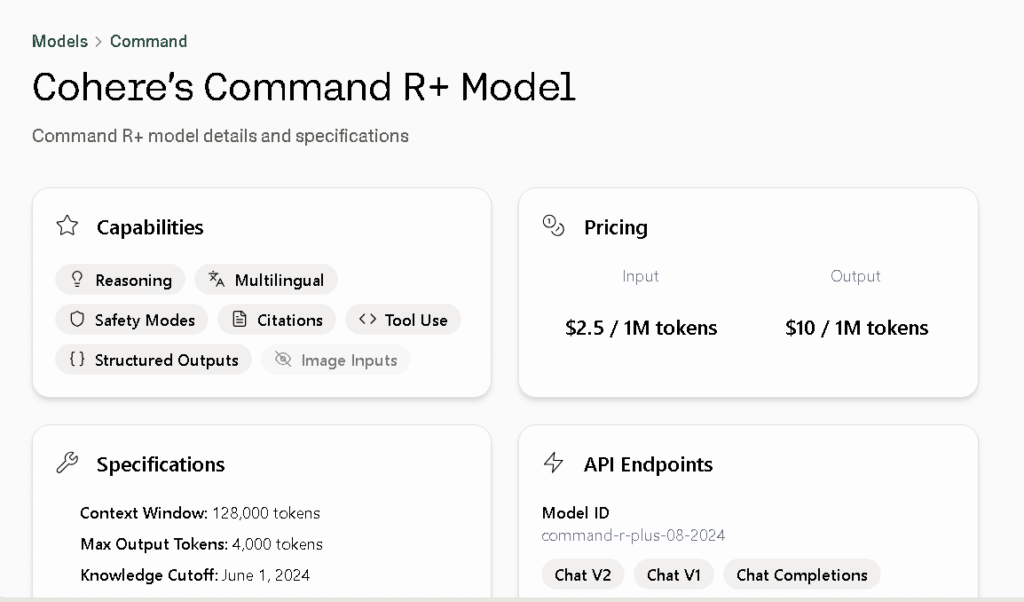
Features:
- Optimized for retrieval-augmented tasks.
- High contextual accuracy for content generation.
- Easy integration into existing systems.
- Fast and reliable for enterprise-scale usage.
Use Cases:
- Automating customer knowledge bases.
- Personalized email campaigns.
- AI-powered content generation.
Pricing: Tiered subscription.
Best For: Content-driven businesses requiring precision and context.
Example: An e-commerce company uses Command R+ to generate personalized product descriptions based on historical user behavior, increasing conversion rates by 20%.
7. Mistral 7B
Overview: Mistral 7B is an open-weight, efficient LLM designed for performance without requiring massive infrastructure.
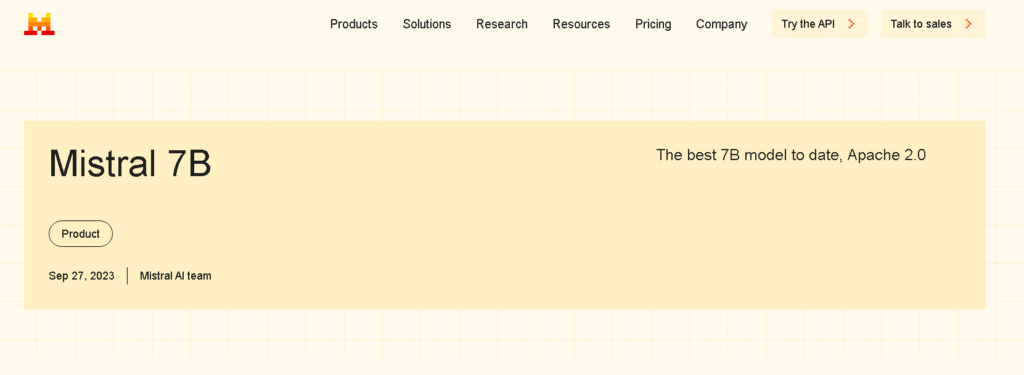
Features:
- Open-weight model for flexibility.
- Efficient performance for low-resource environments.
- Supports diverse enterprise applications.
- Lightweight and cost-effective deployment.
Use Cases:
- Chatbots for SMEs.
- Internal documentation automation.
- Research assistance and prototyping.
Pricing: Free for open-weight; enterprise support optional.
Best For: Small to medium enterprises and developers needing flexible, resource-efficient AI.
Example: A small SaaS company deploys Mistral 7B to automate customer support responses, reducing average resolution time by 40%.
8. Falcon 180B
Overview: Falcon 180B excels at complex text generation and comprehension, making it ideal for enterprises with high-volume text needs.
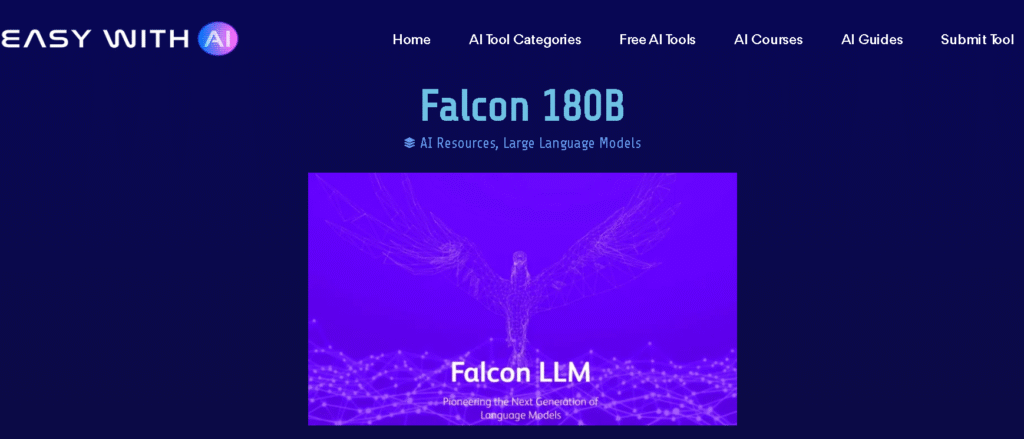
Features:
- Deep understanding of complex text.
- Multilingual support for global applications.
- High performance for enterprise-scale tasks.
- Advanced reasoning and summarization.
Use Cases:
- Technical documentation.
- Customer support automation.
- Large-scale report generation.
Pricing: Subscription-based with enterprise options.
Best For: Enterprises requiring robust text processing capabilities.
Example: A multinational uses Falcon 180B to generate and summarize legal documents, ensuring accuracy across multiple languages.
9. DeepSeek-R1
Overview: DeepSeek-R1 is designed for enterprise data analysis and decision-making, offering actionable insights from large datasets.
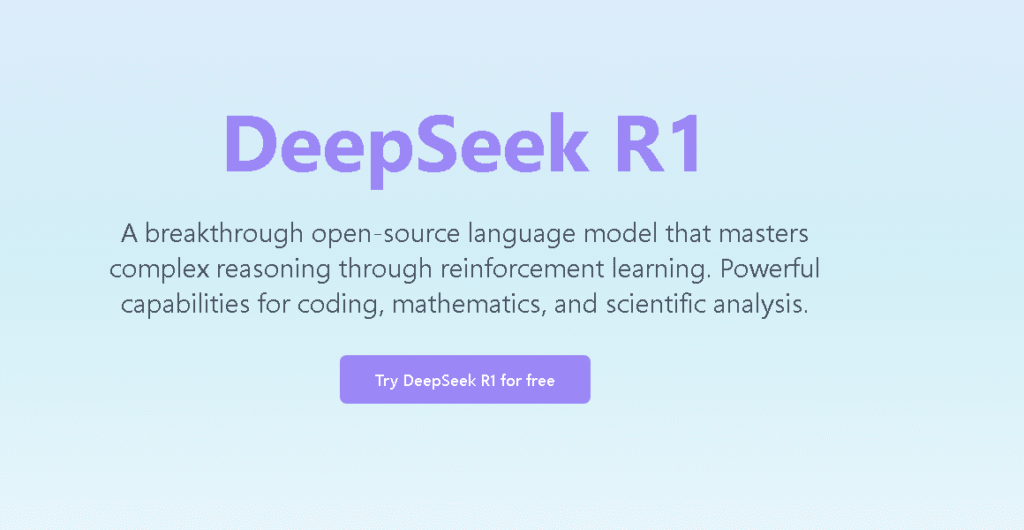
Features:
- Data summarization and predictive analytics.
- Decision support for executives.
- Scalable for large enterprise operations.
- Integration with analytics platforms.
Use Cases:
- Market trend analysis.
- Operational strategy optimization.
- Sales and inventory forecasting.
Pricing: Custom enterprise pricing.
Best For: Data-driven enterprises requiring predictive analytics and decision support.
Example: A retail chain uses DeepSeek-R1 to forecast inventory needs and optimize supply chains, reducing costs by 15%.
10. LLaMA 3.1 405B
Overview: LLaMA 3.1 405B is one of the largest open-source models available, suitable for research and large-scale enterprise deployments.
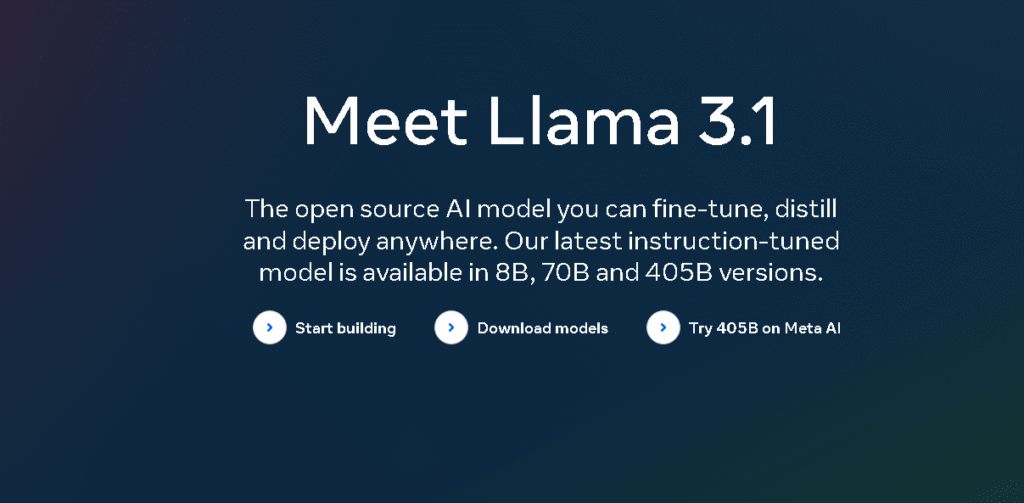
Features:
- Open-source access for maximum flexibility.
- Exceptional performance at scale.
- Multimodal processing capabilities.
- Large-scale deployment support.
Use Cases:
- AI research and experimentation.
- Enterprise-scale knowledge management.
- Custom AI applications for innovation.
Pricing: Free for open-source; optional enterprise support.
Best For: Researchers and enterprises needing massive-scale AI capabilities.
Example: A research lab uses LLaMA 3.1 405B to develop predictive models for healthcare diagnostics, improving early detection rates.
Comparison Table: Best LLM Tools
| Tool | Best For | Key Features | Pricing | Use Cases |
|---|---|---|---|---|
| GPT-4o | Enterprises | Multimodal, advanced reasoning | Subscription | Customer support, marketing, knowledge management |
| Claude Opus 4 | Regulated industries | Ethical AI, high accuracy | Custom | Finance, healthcare, compliance |
| Gemini 2.5 | Google ecosystem | Analytics, cloud integration | Pay-as-you-go | Reports, knowledge management |
| LLaMA 4 | Developers | Open-source, customizable | Free/Enterprise | Research, internal docs |
| Qwen3-Max | Tech companies | 1T+ parameters, code generation | Subscription | Automation, intelligent agents |
| Cohere Command R+ | Content-heavy businesses | Retrieval-augmented | Tiered subscription | Knowledge base, content generation |
| Mistral 7B | SMEs/Developers | Efficient, open-weight | Free/Enterprise | Chatbots, research, internal docs |
| Falcon 180B | Enterprises | Complex text, multilingual | Subscription | Technical docs, customer support |
| DeepSeek-R1 | Data-driven enterprises | Analytics, decision support | Custom | Market trends, predictive analytics |
| LLaMA 3.1 405B | Research/Enterprise | Large-scale, open-source | Free/Enterprise | AI research, enterprise-scale deployments |
FAQ: Best LLM Tools for Businesses
Q1: What is the best LLM tools for startups?
A: Mistral 7B or LLaMA 4 are ideal due to low cost, flexibility, and open-source access.
Q2: Which is best LLM tools for enterprise-scale deployment?
A: GPT-4o, Falcon 180B, or DeepSeek-R1, as they scale well and integrate with enterprise systems.
Q3: Are there LLMs suitable for regulated industries?
A: Claude Opus 4 is designed for safety and compliance, perfect for finance, healthcare, and legal sectors.
Q4: Can LLMs handle multimodal data?
A: Yes, GPT-4o, Gemini 2.5, and LLaMA models support text, image, and audio inputs.
Q5: Which is the best LLM tools for content generation?
A: Cohere Command R+, GPT-4o, and Falcon 180B excel in high-quality, context-aware content.
Conclusion on Best LLM Tools
The top LLM tools of 2025 give companies scalable, adaptable AI solutions for data analysis, customer service, content production, and operational effectiveness. Depending on their particular requirements, open-source, subscription-based, or enterprise-grade models can be advantageous for developers, startups, and big businesses.
You can choose the best large language model tools to boost productivity, automate processes, and spur innovation by carefully weighing your business objectives, integration needs, and financial constraints.
Using the appropriate LLM is a strategic move for business growth and competitive advantage in 2025 and beyond, not just a technological advancement.
At tooljunction, we share honest AI tool reviews and tutorials to help you choose the right tools for your creative projects.





